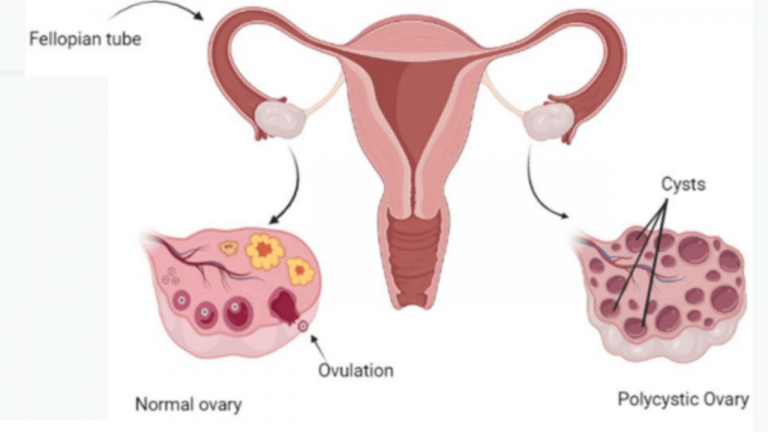PCOS, Types Of PCOS, Here Are All The Details, And Natural Treatment

PCOD is a common condition that leads to irregular periods, acne, hair fall, and several other symptoms in women. Here are the types of PCOS you need to know.
Polycystic ovary syndrome (PCOS) is a hormonal disorder that affects women of reproductive age. It is characterized by the presence of multiple cysts on the ovaries, irregular menstrual cycles, and an excess of male hormones (androgens) in the body. Symptoms of PCOS may include acne, weight gain, irregular periods, difficulty getting pregnant, and excessive facial and body hair. The cause of PCOS is not fully understood, but it is thought to be related to a combination of genetic and environmental factors. There is no cure for PCOS, but it can be managed with lifestyle changes and medications.
This complex hormonal condition, often known as polycystic ovary syndrome, affects women of reproductive age. According to research, women are most likely to experience polycystic ovary syndrome than any other endocrine disorder.
The first step towards preventing PCOS is to understand what can trigger PCOS in women. what are the different kinds of PCOS?
“Understanding which type of PCOS you have, can help you find better solutions. There are 4 types:
Types of PCOS
There are different types of PCOS based on the specific symptoms and underlying causes. Some common types of PCOS include:
Classic PCOS: This type is characterized by the presence of multiple cysts on the ovaries, irregular menstrual cycles, and high levels of androgens.
Non-classic PCOS: This type is similar to classic PCOS, but the symptoms are less severe and may not include multiple cysts on the ovaries.
Insulin-resistant PCOS: This type is characterized by insulin resistance, which is when the body’s cells do not respond properly to insulin, leading to high blood sugar levels. Insulin resistance is often associated with obesity and can lead to an increased risk of diabetes. 70% of you fall under this category and this is when your body cannot metabolize carbs properly.
Post Pill PCOS: Generally, when you stop taking pills after taking them for 6 or more months, it could manifest this way in your body.
Adrenal PCOS: This is because your DHEAS levels will be very high because you’re not capable of managing stress or your body is lacking the coping mechanism around certain events in your life.
Inflammatory PCOS: This type is characterized by inflammation within the ovaries and may be associated with autoimmune disorders. This is when your gut is constantly taking a hit and accompanied by high hsCRP levels, joint pain, eczema, or even psoriasis in many cases.
Hidden PCOS: This type is difficult to diagnose because the symptoms may be subtle or absent.
It is possible that you might not fall into just one type but might be suffering from a combination of 2 or more.”
It’s important to note that these types of PCOS are not mutually exclusive, and a person with PCOS may have characteristics of more than one type. It’s important to work with a healthcare provider to determine the specific type of PCOS and the most appropriate treatment plan.
Natural Treatment For PCOS
There are several natural treatments that may be helpful in managing the symptoms of PCOS. Here are a few options to consider:
Diet and exercise: Maintaining a healthy weight through diet and exercise can help improve insulin sensitivity and regulate menstrual cycles. A low-carbohydrate, high-fiber diet may be particularly helpful.
Herbal natural treatment: Some herbs, such as chaste berry, licorice root, and saw palmetto, may help regulate menstrual cycles and reduce androgen levels. However, it’s important to speak with a healthcare provider before taking any herbal natural treatment as they can interact with medications and may not be safe for everyone.
Acupuncture: Acupuncture may help regulate menstrual cycles and improve fertility in women with PCOS.
Stress management: Chronic stress can exacerbate PCOS symptoms, so finding healthy ways to manage stress, such as through mindfulness practices or therapy, may be helpful.
It’s important to note that these remedies are not a substitute for medical treatment and should be used in conjunction with a healthcare provider’s recommendations.



